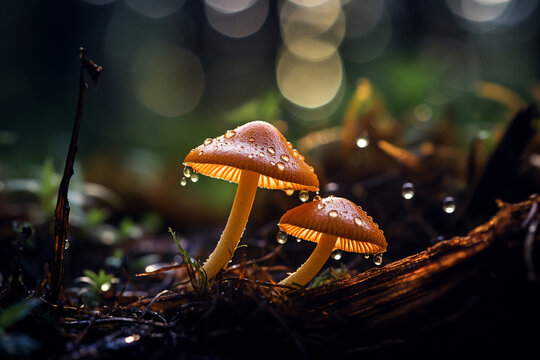THE MYTHS AND MISCONCEPTIONS ABOUT MAGIC MUSHROOMS DEBUNKED

The world of psychedelics, particularly magic mushrooms, is filled with myths, half-truths, and misconceptions. With magic mushrooms gaining increased attention due to their potential therapeutic benefits, it is crucial to separate fact from fiction. Here, we debunk some of the most common myths surrounding magic mushrooms.
1. Myth: Magic mushrooms are highly addictive
Truth: Contrary to popular belief, psilocybin, the active ingredient in magic mushrooms, is not physically addictive. Users do not experience physical withdrawal symptoms when they stop using mushrooms. However, like all substances, they can be misused. Responsible and mindful use is always recommended.
2. Myth: Magic mushrooms can make you “crazy”
Truth: While it’s true that magic mushrooms can lead to intense experiences, including anxiety or panic, in some users, these effects are usually temporary and subside once the results of the mushrooms wear off. It’s essential to approach any psychedelic experience with respect and ideally under the guidance of an experienced guide or therapist.
3. Myth: Magic mushrooms can lead to fatal poisoning
Truth: While some highly toxic mushroom species exist, Psilocybe mushrooms (which contain psilocybin) are not among them. Although an individual may experience unpleasant physical effects, such as nausea or vomiting, death by toxicity from psilocybin mushrooms is virtually unheard of.
4. Myth: Magic mushrooms cause brain damage
Truth: Scientific evidence suggests that magic mushrooms do not cause brain damage. Research indicates that psilocybin may promote neurogenesis (the growth of new neurons) and could potentially have therapeutic effects on the brain.
5. Myth: Magic mushrooms can get stuck in your spinal fluid
Truth: This is a widespread myth with no scientific basis. Psilocybin and psilocin (the active compounds in magic mushrooms) are metabolized and excreted from your body relatively quickly, typically within several hours.
6. Myth: All mushrooms that grow on cow dung are magic mushrooms
Truth: This is a dangerous misconception. While it’s true that some species of psilocybin mushrooms grow in dung, especially that of cattle, not all mushrooms that grow in such conditions are psilocybin mushrooms. Some might be toxic. Accurate identification is vital.
7. Myth: Magic mushrooms lead to reckless behaviour and criminal activity
Truth: Studies have found no correlation between psilocybin use and crime or reckless behaviour. Research suggests that psilocybin can potentially promote pro-social behaviours and increase feelings of well-being and life satisfaction.
8. Myth: Magic mushrooms have no medicinal value
Truth: Research suggests magic mushrooms could have therapeutic potential for depression, anxiety, PTSD, and substance abuse disorders.
Misinformation surrounding magic mushrooms is rife, fueled by years of stigmatization and lack of understanding. As scientific research into magic mushrooms and their effects continues, many of these myths are being debunked, paving the way for a more accurate understanding of these fascinating fungi.